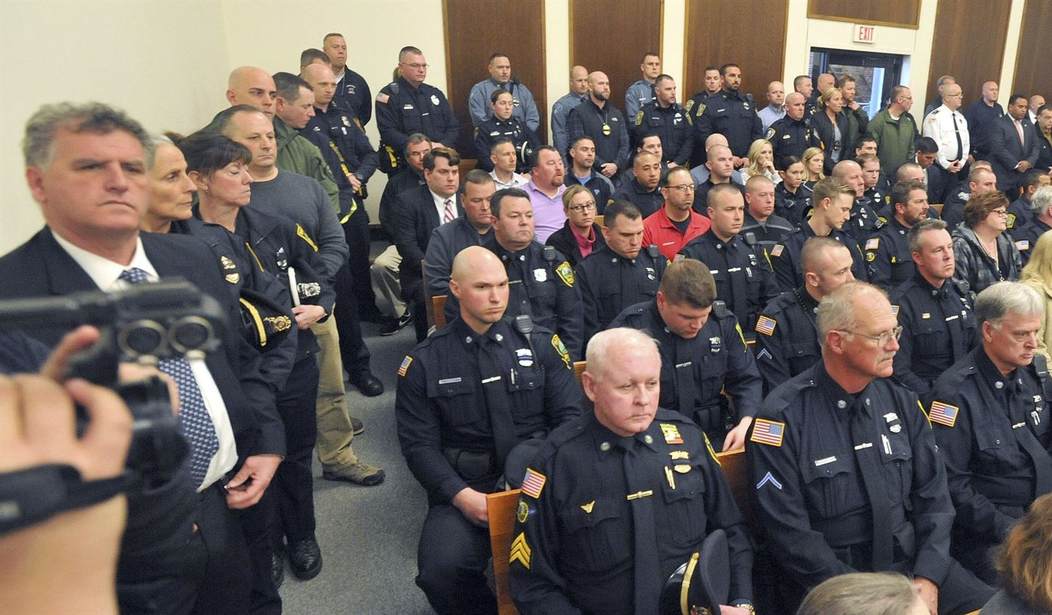In Massachusetts, a court case that was launched in 2006 finally reached a resolution this week. Hundreds of Black and Hispanic police officers went to court claiming that they had been unfairly passed over for promotions for reasons driven by racism. Under the terms of the settlement, each of the plaintiffs will receive approximately $60,000. The unusual aspect of this case is that the plaintiffs were not alleging racist behavior on the part of their supervisors. (Or at least not all of them.) They claimed that the sergeant’s exam they were required to take to receive a promotion was discriminatory. (Daily Beast)
After nearly 15 years of litigation, the Suffolk County Superior Court on Thursday awarded more than 600 Black and Latinx police officers a total of $40 million in compensation, finding they were overlooked for promotion due to a discriminatory promotional exam.
A court order released Thursday from the Suffolk County Superior Court found the state’s human resources division “had an unlawful disparate impact upon Black and Latinx candidates in the police sergeant promotional examinations” and “interfered with class members’ rights to consideration for promotion.”
One of the plaintiffs, Abel Cano Jr., now 55, told The Daily Beast that despite having a master’s degree in criminal justice and an extensive background of experience, he was denied a promotion on multiple occasions.
If this had simply been a case of predominantly white supervisors selecting white officers for advancement, the complaints of the plaintiffs would be understandable. After all, despite its reputation as a liberal, progressive stronghold, Massachusetts in general, and Boston in particular has a long and well-established history of being one of the most racist places in the country. One recent poll by a local news outlet found that 80% of Bostonians (of all colors) said that racism was a “significant” problem in their city.
But that’s apparently not what the complaint involved. A significant part of the linked report is based on an interview with Abel Cano Jr. who is one of the plaintiffs and is quoted in the excerpt above. He described the sergeant’s exam as consisting of 80 questions “pulled from 10 books” that have to be completed in two hours. He said that it required a lot of memorization on subjects not related to the actual job and employed “trick questions.”
First of all, Cano reportedly has a master’s degree in criminal justice along with significant job experience. It seems as if someone with a master’s degree should be used to memorizing material and taking exams, but his description makes it sound like it was definitely a very challenging test that required a lot of preparation.
Yet that’s where we come to the sticking point. Whether the test was easy or wildly difficult, everyone was taking the same test. It’s certainly possible that the test contained irrelevant or outdated material and might be in need of a thorough review. But if you just make the test significantly easier, won’t the higher-scoring people simply do even better as well and still wind up being selected for promotions? If the argument is that the test scores shouldn’t be a determinative factor, how else do you suggest that such promotions be approved? Eliminating the test would make this seem like another front in the War on Merit.
There have been cases uncovered where significant racial disparities showed up in test results and they were verifiable. Some of the early IQ tests included multiple-choice, “fill in the blank” questions. One of the more infamous ones was “Cup and [blank].” The correct answer was “saucer.” But students from lower income homes (who were disproportionately minority students) came from families where full dinnerware wasn’t as common and coffee or teacups were not placed on saucers. Those students mostly chose “spoon” as the answer and were marked down.
But would an effect like that be seen in a police advancement exam? Without having the full exam to review it’s impossible to say, but it doesn’t strike me as being quite as likely. In any event, the plaintiffs will receive their compensation and perhaps the state can take this opportunity to review the exams to determine if they require improvements.








Join the conversation as a VIP Member